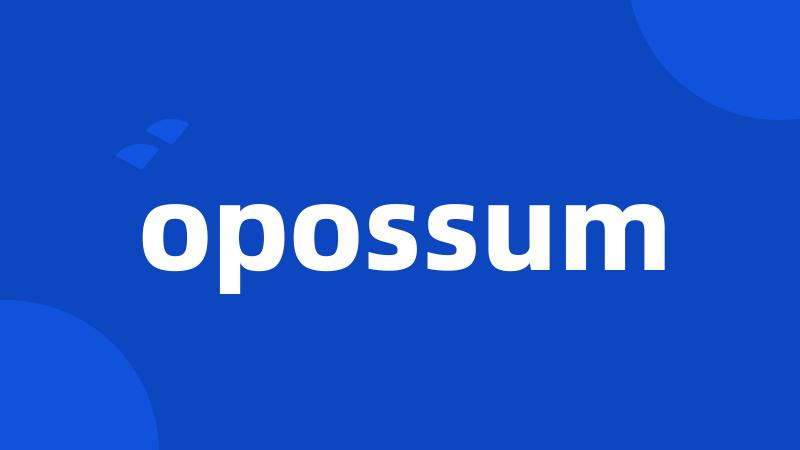opossum
美 [əˈpɑsəm]英 [əˈpɒsəm]
- n.负鼠(产于美洲或澳大利亚的小动物,在树上生活,携幼崽于母兽育儿袋中)
- 网络尾有卷握力的小有袋动物;负鼠目;奥珀瑟姆
复数:opossums
 opossum
opossumopossum
负鼠
生物名词中英文对照_百度文库 ... ground-living bird: 走禽 opossum: 负鼠 bee: 蜜蜂 ...
尾有卷握力的小有袋动物
新编考研... ... mutation n. (动物、植物的)突变,变异 opossum n. 尾有卷握力的小有袋动物,负鼠 Self-replicating a. 自我复 …
负鼠目
鼠李马铃薯蚜 in English,... ... 负鼠 ;possum;opossum 负鼠目 opossum 甘蔗花叶马铃薯y病毒组 sugarcane mosaic potyvirus ...
奥珀瑟姆
亚瑟士 English, 翻译, 例句, 字典... ... 壮士 hero;fighter;brave strong guy;warrior 奥珀瑟姆 opossum 波瑟姆 possum ...
负鼠皮
...、猞猁皮(lynx)、海狸鼠毛皮(nutria)、负鼠皮(opossum)、郊狼皮(coyote)、南美洲栗鼠皮(chinchilla)和兔子皮 …
负鼠或负子鼠
原来牠叫负鼠或负子鼠(opossum), 是源自南美洲的有袋动哺乳类,性情温顺,常常夜间外出,喜欢生活在树上,也有水栖类。 …
灰色短尾负鼠
生物服务在线 eBioService ... Mouse cytomegalovirus 小鼠巨细胞病毒 Opossum 灰色短尾负鼠 herpes virus in chicken 鸡疱疹 …
1
"I must have a special seat" said Opossum "Everyone must be able to see my beautiful bushy tail" .
“我必须有一个特殊的座位说:”负鼠“每个人都必须能够看到我的美丽浓密的尾巴”。
2
Another animal that uses its tail as a "hanger" is the opossum. The opossum also uses its tail to help it climb trees.
负鼠也是一种把尾巴当挂钩使的动物,除此之外,负鼠的尾巴还有助于它攀爬树木。
3
Opossum populations in the U. S. are down due to the fragmentation of their forest habitats.
因为森林生境的碎片化,美国的负鼠种群正逐渐减少。
4
Except for a marsupial (such as the kangaroo or opossum), a giant panda baby is the smallest mammal newborn relative to its mother's size.
除了有袋动物(例如袋鼠或负鼠),大熊猫婴儿是相对于它母亲尺寸的最小的哺乳动物新生儿。
5
When he arrived at the dance, Rabbit led Opossum to his special seat.
当他在舞蹈赶到,导致负鼠兔对他的专座。
6
The cross-eyed opossum is Germany's biggest media sensation, and she has not even made her debut at the Leipzig Zoo.
这只斗鸡眼负鼠还没在莱比锡动物园公开露面,就已经成了德国最闪亮的媒体焦点。
7
Heidi, the cross-eyed opossum who became an Internet sensation in December, moved into new digs at the Leipzig Zoo in Germany.
一只对视着你的负鼠轰动了互联网,也因此搬进了德国莱比锡动物园。
8
The only exceptions are nocturnal creatures such as bats, owls, opossum or rats to name a few.
只有夜行性动物除外,如蝙蝠、猫头鹰、负鼠或老鼠略举几例。
9
Cricket's gentle combing of his tail soon made Opossum sleepy.
板球的温柔,他很快就负鼠尾梳理昏昏欲睡。
10
Opossum was very pleased and Rabbit ran off as fast as he could, because he couldn't stop laughing.
负鼠和兔子感到非常高兴尽可能快地跑了他,因为他无法停止笑。
